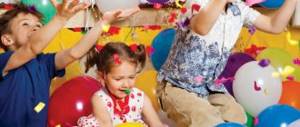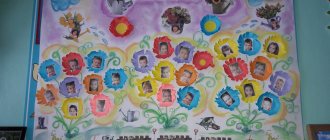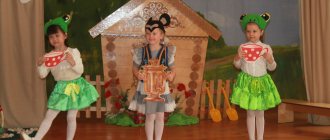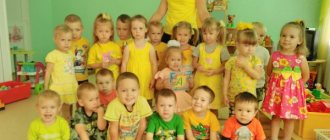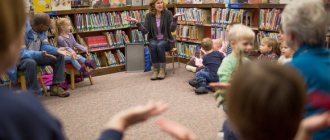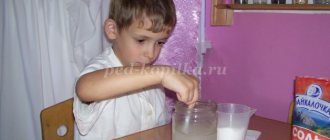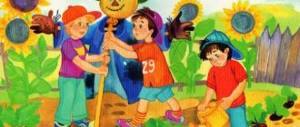Pedagogical project on the topic: “Home speech therapist”
• the need for parental participation in the correctional and speech therapy process and the lack of effective technologies for interaction between the educational institution and the family in this area;
Based on the above, we see the relevance and significance of the problem of increasing the competence of parents in matters of children's speech development.
Project participants:
Teacher-speech therapist, children of older, preparatory preschool age, their parents, educators.
Conceptual Framework
The theoretical basis of this project is the principle of personality-oriented training, correction and development. The implementation of this principle entails not only the development of personality and social integration of the “special” child, but also the professional and personal improvement of the teacher, parent, and the whole family. Outstanding teachers of the past were convinced that the main educators of a child in preschool childhood are parents. L.S. Vygotsky O. Thanks to the efforts of scientists and practical teachers (L.V. Zagik, T.A. Markova, L.F. Ostrovskaya, N.G. Godina), the content, forms and methods of work of a child care institution with a family were developed. The involvement of parents in the orbit of pedagogical activity, their interested participation in the correctional pedagogical process is important not because the speech therapist wants it, but because it is necessary for the development of their own child. The most important task of working with parents and its primary condition is to establish a relationship of trust and acceptance between the specialist and the parent.
Issues of family education of children with problems in speech development were dealt with by G.A. Volkova, Yu.F. Garkusha, G.V. Gurovets, S.T. Grigoryan, L.N. Efimenkova, N.L. Krylova, V.I. Lubovsky, E.M. Mastyukova, E.V. Mironova, A.G. Moskovkina, N.V. Novotortseva, L.P. Noskova, V.I. Seliverstov, T.B. Filicheva, G.V. Chirkina and others. The authors emphasize the role of the immediate environment (family) in the process of correctional pedagogical influence on preschoolers with speech disorders, and consider the organization of proper family education of such children to be one of the conditions for creating a development environment for them. A special place in this process is given to improving the psychological and pedagogical culture of parents. The authors call the most important prerequisites for increasing work efficiency the formation of a motivated attitude towards correctional work among parents and active involvement in it.
Issues related to the study of parents' pedagogical competence are reflected in the works of P.P. Blonsky, I.V. Grebennikova, P.F. Kaptereva, N.K. Krupskaya, P.F. Lesgafta, A.S. Makarenko, V.M. Miniyarova, V.A. Sukhomlinsky, S.T. Shatsky and others. The formation of the pedagogical competence of parents by various social institutions is presented in the publications of S.A. Belicheva, V.G. Bocharova, I.V. Grebennikova, A.C. Spivakovskaya, L.G. Petryaevskaya, S.S. Piyukova and others.
How does a speech therapy commission work in kindergarten?
Many parents want to enroll their child in a combined kindergarten and are wondering how to get into a speech therapy group in a kindergarten. The number of children in such groups is smaller than in a regular group and the preparation for learning to read and write is stronger there. But it is possible to become one of the children who are entitled to such training only through the Psychological, Medical and Pedagogical Commission (PMPC).
To pass this commission, you first need to visit some doctors: an ophthalmologist, a dentist, a neurologist, an otolaryngologist, a pediatrician and a surgeon. At PMPK, commission members work according to an individual plan, depending on each person’s needs.
Speech therapy examination of preschool children
If a commission is assembled to examine a preschooler with speech impairments, the following tasks may be offered:
- name the seasons;
- find the odd one out;
- assemble a pyramid or sorter;
- repeat a simple couplet of a poem;
- talk about your family
Speech therapy examination
- name colors or shapes;
- describe the plot of the picture;
- name streets and avenues;
- list famous insects, items of clothing, professions;
- describe the letter city.
Treatment of stuttering in a 3-year-old child at home
Based on the examination, the legal representatives are given a conclusion containing the recommended educational program and kindergarten group.
Bukvograd
Speech therapy groups, principles of their recruitment and selection of children
Kindergartens provide differentiated education for children with speech impairments. Depending on the nature of the speech therapy deficiency, all children are divided into groups:
- children with phonetic-phonemic underdevelopment of speech (FFN);
- children with impaired pronunciation of individual sounds (NPOS);
- children who stutter;
- children with general speech underdevelopment (GSD).
Different groups are accepted for different periods of study: children with functional disabilities and those who stutter for 1 year, children with non-specific disabilities for six months, and children with special needs for 2-3 years.
Note! The task of differentiation and recruitment of groups faces the psychological, medical and pedagogical commission. At the end of the training, the commission is held again and a decision is made to continue working in this program, or transfer to a general group.
How to get to a speech therapy kindergarten
If parents, for one reason or another, want to enroll in a speech therapy kindergarten, then they need to take the following steps:
- Join the general queue at the preschool educational institution, indicating priority kindergartens (in this case, a kindergarten where a special speech therapy educational program is carried out).
- Come to an appointment with your local pediatrician and take a referral to a speech therapist.
- See a speech therapist and take a referral to a primary medical care program.
- Having collected all the documents, come to the PMPK and get a conclusion.
- Having received a place in the kindergarten, come with documents and the conclusion of the PMPK to conclude an agreement with the kindergarten.
Currently, diagnostic methods for young children are becoming increasingly popular. It is necessary to make full use of the capabilities of psychological and speech therapy diagnostics for the timely identification of areas of necessary correctional work and the further successful development of preschool children.
The Tale of the Happy Tongue: speech therapy project
Kutuzova V.V. The Tale of the Cheerful Tongue: a speech therapy project // Owl. 2020. N1 (19). URL: https://kssovushka.ru/zhurnal/19/ (date of access: 10.10.2020).
Order No. 583397
APPENDIX: Appendix to the article
Modern speech therapy is in a constant active search for ways to improve and optimize the process of learning and development of children at different age stages and in various educational conditions that are typical for children with speech disorders.
Experience and modern research show that the pedagogical process can only increase the capabilities and quality of development of a child with speech underdevelopment to the extent that the teacher knows how to competently manage it. Success is determined by the methods and techniques of a student’s education.
The use, along with traditional ones, of innovative pedagogical technologies opens up new opportunities for the education and training of preschoolers with speech impairments, and the project method has become one of the most effective today.
It gives the child the opportunity to experiment, synthesize acquired knowledge, develop creativity and communication skills, thereby preparing him for successful learning at school. The knowledge and skills that a child acquires in the process of practical activity are acquired faster, easier and give better results; Complex and sometimes uninteresting speech therapy exercises become an exciting activity for the child.
By solving various cognitive and practical problems during the design process together with adults and peers, children with speech underdevelopment motivatedly enrich and activate their vocabulary, learn to speak publicly, and communicate adequately with others.
Many years of experience in speech therapy work have made it possible to identify some difficulties and contradictions that may arise in the process of implementing this issue.
Firstly, there is a steady trend towards an increase in the number of children with speech disorders.
Secondly, in order to increase children’s interest in speech therapy classes, we need a variety of creative tasks and new approaches to correctional work.
Thirdly, the child’s weak motivation for cognitive activity, the lack of full speech activity on the one hand, and the low level of interest and competence of parents in matters of children’s speech development.
Fourthly, the degree of development of the problem. In modern literature, more and more articles and publications are appearing that in one way or another touch on the topic of using the project method in working with preschoolers. But the area of application of this method in speech therapy practice remains poorly developed.
The goal is to increase the potential for full speech development of preschool children.
objectives :
Educational:
- develop speech activity;
- develop fantasy and imagination.
Educational:
- create a New Year's mood, a desire to create and bring joy to others;
- make children and parents want to participate in the project;
- involve parents as active participants in preparation for the project.
Educational:
- to form ideas about the organs of speech, their importance for correct sound pronunciation;
- formulate the concept of “Articulation”, highlight the characteristic features of the correct pronunciation of sounds;
- create conditions for children to become acquainted with the organs of articulation.
Corrective:
- develop subtle differentiated movements of the articulatory apparatus using non-traditional complexes.
Expected result:
- Using the project method in correctional work will contribute to the successful development of children's communicative and creative abilities.
- Increasing the psychological and pedagogical competence of teachers and parents in matters of children's speech development.
- Increasing parents' interest not only in the results, but also in the process of correctional and educational work itself.
Type of project: informational, practice-oriented, collective
Project type: short-term
Project participants: children with speech disorders, speech therapist, educators, parents.
Problem situation: a project in speech therapy work with preschool children will allow pupils to quickly, easily and more firmly “appropriate” knowledge and skills that are acquired in the process of practical activities, will increase the child’s motivation and the interest of parents in the speech development of their children.
Project products:
- homemade book “Tales of the Merry Tongue.”
Integration of educational areas: cognitive development, speech development, social and communicative development, artistic and aesthetic development, physical development.
Integration of children's activities: play, cognitive-research, motor, productive, communicative, reading (perception of fiction).
Subject-spatial development environment: kindergarten territory; in the group: visual aids.
Facilities and equipment:
Technical: laptop, projector.
Methodological: visual aids (articulation profile), illustrations for articulation exercises, a selection of fairy tales about the “Merry Tongue”.
Organizational: tables, oilcloths, paper, wax crayons, watercolors, gouache, brushes. Stages of the project “The Tale of the Merry Tongue” for children 5-7 years old with speech impairment.
| Project stages | Activities of the teacher | Children's activities |
| Stage 1. Search. | Creating conditions for children and parents to enter into a problematic situation. Determining the interest and level of knowledge of children on the topic of the project. Formation of a data bank on the level of parental competence in matters of the designated topic. | Accept the task. |
| Stage 2. Analytical. | Collection of information: — selection of software and methodological support for project implementation; — studying the experience of innovative teachers on the project topic; — replenishment of the subject-development environment; — involving parents in working on the project; — a selection of consultations on the topic of the project. | They plan with the teacher what they will do together for this: draw, glue, learn poems, songs, dances, negotiate with parents about joint work, bring additional material from home. |
| Stage 3. Practical. | Design of current work on project activities: see long-term plan (appendix). - conduct a drawing lesson; — learn sets of articulation exercises; - come up with a fairy tale about the Cheerful Tongue; — create conditions for the practical application of acquired knowledge. | Draw a funny tongue; Learn articulation exercises; They come up with a fairy tale about the Merry Tongue |
| Stage 4. Presentation. | Presentation of a collective homemade book “Tales of the Merry Tongue” Practical application of project products in morning corrective gymnast | Exhibition of collective homemade books "Tales of the Merry Tongue" |
Long-term plan for the project “The Tale of the Merry Tongue” for children 5-7 years old studying at the preschool educational institution’s speech center
| Days of the week | Joint activities of adults and children, taking into account the integration of educational areas. | Organization of a developmental environment for children’s independent activities. | Interaction with parents. | ||
| Joint activities between adults and children. | Individual activities with children. | Educational activities in special moments. | |||
| Monday 07.10.19 | Getting to know the organs of articulation | “Explain to your comrade the correct location of the organs of articulation...” | Guessing riddles about teeth, lips, tongue | Prepare a set of illustrations | Informing parents about the tasks of a speech therapist in a preschool educational institution. |
| Tuesday 08.10.19 | Conversation “Articulatory patterns of sounds” | Using gaming techniques of articulation analysis in individual lessons for correcting sound pronunciation | Practical application in morning exercise | Add to the group an album with illustrations of articulation exercises | Reminders “Structure of the articulatory apparatus” |
| Wednesday 09.10.19 | Learning poems for exercises. | individual learning of complexes of articulation exercises | Drawing a picture “Funny tongue” | Design of an exhibition of drawings | Help parents draw pictures. |
| Thursday 10.10.19 | Collective invention of the fairy tale about the Merry Tongue | Do exercises using bright illustrations | Determining the place of articulatory gymnastics in group mode | Individual demonstration of performing exercises aimed at developing the articulatory structure of a specific group of sounds. | |
| Friday 11.10.19 | Reading the fairy tale about the “Jolly Tongue” | Didactic game “Pick a picture” | Presentation of a collective homemade book “Tales of the Merry Tongue” | Repetition of an invented fairy tale | |
Literature:
- Babina E.S. Partnership between preschool educational institutions and families in speech therapy work // Speech therapist. 2005. No. 5.
- Budennaya T.V. Speech therapy gymnastics. St. Petersburg: Detstvo-Press, 1999. 64 p.
- Buyko V. Miracle teacher. Ekaterinburg: Litur, 2006.
- Veraksa N.E., Veraksa A.N. Project activities for preschoolers. M., 2010.
- Evdokimova E.S. Design technology in preschool educational institutions. M.: Sfera, 2005.
- Kiseleva L.S. project method in the activities of a preschool institution. M.: Arti, 2005.
- Konovalenko S.V., Kremenetskaya M.I. Development of the psycho-physiological basis of speech in preschool children with developmental disorders. St. Petersburg: Childhood-Press, 2012. 112 p.
- Krupenchuk O.I. Poems for speech development. St. Petersburg: Litera, 2004. 64 p.
- Mironova S.A. Speech development of preschool children in speech therapy classes. M. 2007.
- Nishcheva N.V. Fun articulation gymnastics. St. Petersburg: Detstvo-Press, 2020. 32 p.
- Repina Z.A., Buyko V.I. Speech therapy lessons. Ekaterinburg: Litur, 1999. 208 p.
- Fadeeva Yu.A., Zhilina I.I. Educational projects in a group for children with special needs. M., 2012.
